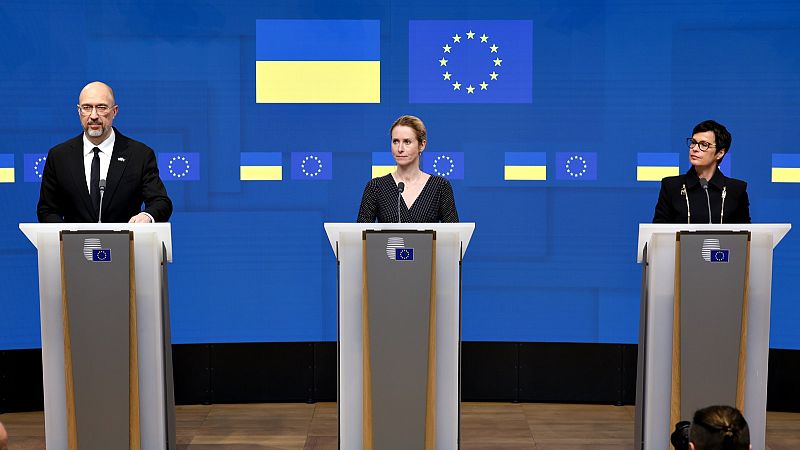Ukraine Sets Red Lines in US Minerals Deal to Assure Brussels

Ukraine has aimed to assure the European Union that it will remain committed to its membership application despite ongoing technical-level discussions with the United States regarding a minerals agreement.
"It needs to be a partnership agreement with equitable terms for all parties involved," stated Ukrainian Prime Minister Denys Shmyhal on Wednesday during his trip to Brussels.
The preliminary version of the accord, which was disclosed to the media last month, includes sweeping terms This would grant America a "first look" opportunity and unparalleled influence over Ukraine's natural resources via a jointly managed investment fund.
As reported by the Financial Times and Bloomberg, the fund’s governing body will consist of five individuals: three nominated by the United States and two selected by Ukraine. This setup effectively allows Washington to have significant influence over major choices concerning initiatives related to infrastructure such as highways, rail systems, harbors, mining operations, petroleum, natural gas, and the retrieval of essential raw materials.
According to Bloomberg, Ukraine would need to submit all new initiatives to the fund for evaluation “at the earliest opportunity.” Should these proposals be rejected, Ukraine would not be allowed to offer them to others under more favorable terms.
Furthermore, the United States would have the right to claim all the earnings from the fund along with a 4% yearly return until the total amount of military and financial assistance given to Ukraine is completely reimbursed. The Kiel Institute for the World Economy estimates U.S. support has been valued at €114 billion since the beginning of Russia's full-scale invasion.
The "payback" concept has been crucial for Donald Trump's drive to ink this agreement, sparking claims of exploitation and neo-colonialism.
These provisions are extremely broad, and if implemented, they would make it nearly impossible for Ukraine to comply with the European Union’s standards regarding competition, the internal market, public procurement, and transparency—criteria that are crucial for aspiring member states.
On Wednesday, Shmyhal made it clear that joining would always be more important than any business agreement.
"The prime minister stated during a press conference following the EU-Ukraine Association Council that we definitely have certain boundaries," he emphasized.
To begin with, this is our Constitution. Secondly, we have European ambitions and duties, making this yet another non-negotiable point. Thirdly, there’s also international law to consider.
A special team of Ukrainian experts backed by international legal professionals has been formed to spearhead the technical discussions, according to him. These negotiations will commence in the United States this weekend and carry on into next week, with an emphasis on establishing a joint investment fund.
"We will review the outcome following these discussions," he stated.
We remain quite hopeful as we anticipate discovering ways to transform this accord into a genuine partnership agreement. I am speaking very earnestly about this.
"I think the technical teams will collaborate effectively," he mentioned additionally.
Beside him stood Marta Kos, the European Commissioner for Enlargement, responsible for overseeing Ukraine’s bid for EU membership. She seemed comforted by Shmygal's clear boundaries.
The European Commission will back any agreement beneficial for Ukraine," Kos stated to journalists. "During our discussions today, we received numerous assurances that Ukraine will continue on its European journey, hence I do not perceive any risk.
She continued, saying that increasingly, the expansion process is viewed as a security assurance for Ukraine.
Collectively, this indicates that without doubt, we will cover all matters related to the US within the context of the expansion process.
Kos mentioned that Brussels aims to initiate the six areas of Ukraine's EU membership process by the end of this year, a target echoed by Kyiv. However, each stage necessitates the collective approval of all 27 member nations, with Hungary consistently expressing its disapproval and even taking steps to oppose it. public consultation to collect citizens' views.
We communicate with the Hungarian governmental representatives and anticipate that all parties engaged will demonstrate goodwill and a readiness to achieve a compromise," Kos stated, cautioning that the Commission’s internal operations were fundamentally constrained by political factors.
A total of 26 member states have agreed to proceed.
When asked about Hungary's election, Shmygal stated that his administration would strive to undertake all necessary reforms and actions, particularly those concerning the safeguarding of national minorities—a topic that Budapest has frequently emphasized.
He stated, 'We rely entirely on crystal-clear decisions from the European Union and its member states.'





